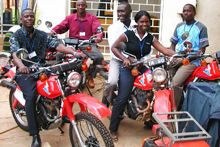
CapacityPlus Participates in Meeting Focusing on Frontline Health Workers
Doris Mwarey recently represented CapacityPlus at the Consultation on Improving Access to Health Workers at the Frontline for Better Maternal and Child Survival in Nairobi, Kenya.
The meeting brought together key stakeholders for scaling up country responses to addressing health workforce needs for Every Woman Every Child and the Global Plan towards the Elimination of New HIV Infections Among Children by 2015 and Keeping their Mothers Alive, and focused on frontline health workers.
 Frontline health workers are often community health workers and midwives, but can also include pharmacists, nurses, and doctors that work in community clinics. They are especially needed in rural and remote areas and deliver services such as educating communities on family planning and HIV prevention, counseling pregnant women, and managing uncomplicated childhood illnesses. CapacityPlus supports frontline health workers and developed approaches aimed at increasing community health workers’ effectiveness and productivity.
Frontline health workers are often community health workers and midwives, but can also include pharmacists, nurses, and doctors that work in community clinics. They are especially needed in rural and remote areas and deliver services such as educating communities on family planning and HIV prevention, counseling pregnant women, and managing uncomplicated childhood illnesses. CapacityPlus supports frontline health workers and developed approaches aimed at increasing community health workers’ effectiveness and productivity.
Over 50 participants representing 17 countries and 33 organizations attended. IntraHealth International, CapacityPlus lead partner, was an organizer of the conference along with The Norwegian Agency for Development Cooperation, The Regional Network on Equity in Health in Southern Africa, UK Department for International Development, Save the Children, The African Centre for Global Health and Social Transformation, and others.
Kenya’s minister for medical services officially started the meeting, followed by a “Setting the Scene” session that provided a background on the conference and clarified objectives and expected outcomes. IntraHealth’s Barbara Stilwell was a panelist for this session and highlighted the need for innovation in addressing the management of community health workers. She challenged participants to explore ways to support community health workers, such as creating career paths to incorporate them into the formal health system, and highlighted the need to strengthen referral and supervision systems.
Participants broke into groups to discuss country experiences related to the health workforce including planning; providing quality reproductive health and maternal, neonatal, and child health services, including the prevention of mother-to-child transmission of HIV; and addressing organizational and regulatory issues, demand and continuity of services, retention, skill mix, and incentives. Plenary sessions included further discussion of scale-up, accountability and bottleneck analysis, and opportunities for public-, NGO-, and private-sector partnerships.
The final conference communiqué highlighted several recommendations for countries, including the following that align with CapacityPlus’s goals and are potential areas for collaboration and support:
- Ensure optimum service integration at the frontline, guided by identified competence needs and appropriate skill mix in context.
- Address mutual accountability and support mechanisms for access to health workers at frontline services.
- Work with civil society, academia, faith-based organizations and other nonstate actors to strengthen the evidence base on the impact of initiatives and interventions at the frontline.
- Strive to improve supply of health workers, which should be complemented by community awareness of and demand for the services available at the frontline.
- Focus on workers at the frontline of services and their functions, recognize their value in the system in ensuring equitable access and the need for health workers at other levels of the service delivery system to enable and support their role.
- Develop mechanisms for the translation and adoption of global and continental initiatives to specific country contexts and needs. This should always include clear monitoring and evaluation processes.
Related items:
Photo by Bruno Benavides. (Community health workers in Uganda)


